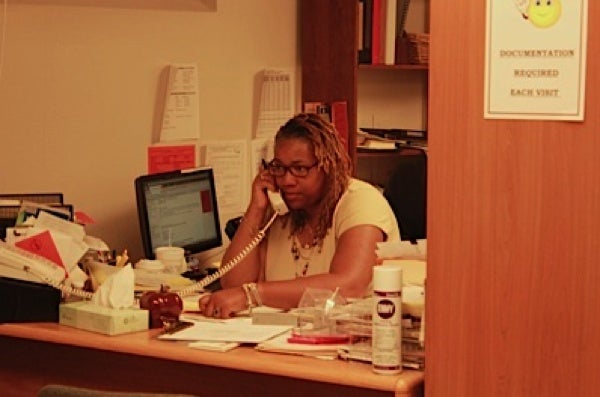Germantown Avenue Crisis Ministry director: Times are getting tougher
With the number of people in need of emergency assistance steadily increasing, the Germantown Avenue Crisis Ministry has opened its cupboard every Thursday to distribute food.
Founded in 1997, the non-profit Crisis Ministry is located inside of the First Presbyterian Church at 35 W. Chelten Ave. Its mission is to help clients stabilize their lives, and to become self-sufficient, with resources donated by the community and the organization itself.
Services range from providing food, fuel, clothing and housing to referring clients to outside organizations.
Clients who visit the food cupboard are generally in need of temporary support to overcome unexpected obstacles like when the head of household is unemployed, illness, having exhausted the use of public assistance and limited income.
A change in demographics
Eileen Jones, the ministry‘s director for 10 years, said the past few years have brought about a shift in the clientele because of the economic downturn.
“There was time when we would see a lot of our clients have some form of mental-health issue that may have debilitated them, but now many of clients are just like you and I,” Jones said.
While several organizations in Germantown offer emergency food assistance, the Crisis Ministry is one of few that allow clients to select their own items.
Family size determines the number of items an individual receives and packages are available on a first-come, first-served basis. The cupboard provides perishable and nonperishable food items every 30 days for the residents and is open from 10 a.m. to 4 p.m. every Thursday.
The services are appreciated
Deborah Jackson-Smith, a new client of the ministry, is unemployed and has turned to the food cupboard for assistance.
“I have no money and now I’m down to no food. My electricity is on shut-off notice and my son will be coming home from college soon. I don’t want him to come home to no lights and food,” said Deborah Jackson-Smith. The Crisis Ministry “has been a great asset to the community. I recently found out about the days that the food is distributed and it couldn’t have happened at a better time.”
Once a client has provided proof of residence and income, a valid photo ID and Social Security cards for the entire household, the individual can receive Crisis Ministry assistance.
“I hope to receive food today and some solid prospects for the future,” Jackson-Smith said. “They have several programs here to help the underdog and I hope that they will be able to assist with other aspects of stabilizing my future.”
Contributions help keep the cupboard stocked
Individual donations and contributions from other local organizations help the food cupboard stay afloat.
“The more food that we have donated that’s the less we may need to purchase. It allows our cupboard to have variety because when we purchase, we’re going for the best buy and that may be no-name or off-brand items,” Jones said. “The donations give clients the option where they can come in and select and see some of the things that, if they had the resources, they would be buying themselves.”
Holiday seasons bring in the most donations, which helps because that is the ministry’s busiest time of the year.
“We do get food from Philabundance. We have other congregations who take up collections for us, individuals who bring us food and schools,” Jones said. “Thanksgiving and Christmas is wonderful. Last year, we did 200 baskets complete with turkey and trimming for Thanksgiving.”
Volunteers chip in
Zina Patterson, a volunteer at the ministry, cleaned the shelves and canned goods in preparation for Cupboard Thursday.
The ministry’s volunteers are the hands behind the cupboard. They make sure it stays clean and functions properly.
Over the past year, the ministry was able to hire administrative assistance, but Jones said she would like to see the ministry expand.
Her hope is that, one day, the ministry could host budgeting classes to individuals in need of financial guidance. She would also like to establish a more formal computer space for client usage.
More than anything, she wants to help the clients overcome the negative times and reach a level of independence.
“We want people to be more grounded and be more understanding of how to handle issues while under stress,” Jones said.
****
Shanise Redmon and Monet Tucker are students at Temple University. Philadelphia Neighborhoods, a NewsWorks content partner, is an initiative of the Temple Multimedia Urban Reporting Lab.
WHYY is your source for fact-based, in-depth journalism and information. As a nonprofit organization, we rely on financial support from readers like you. Please give today.







